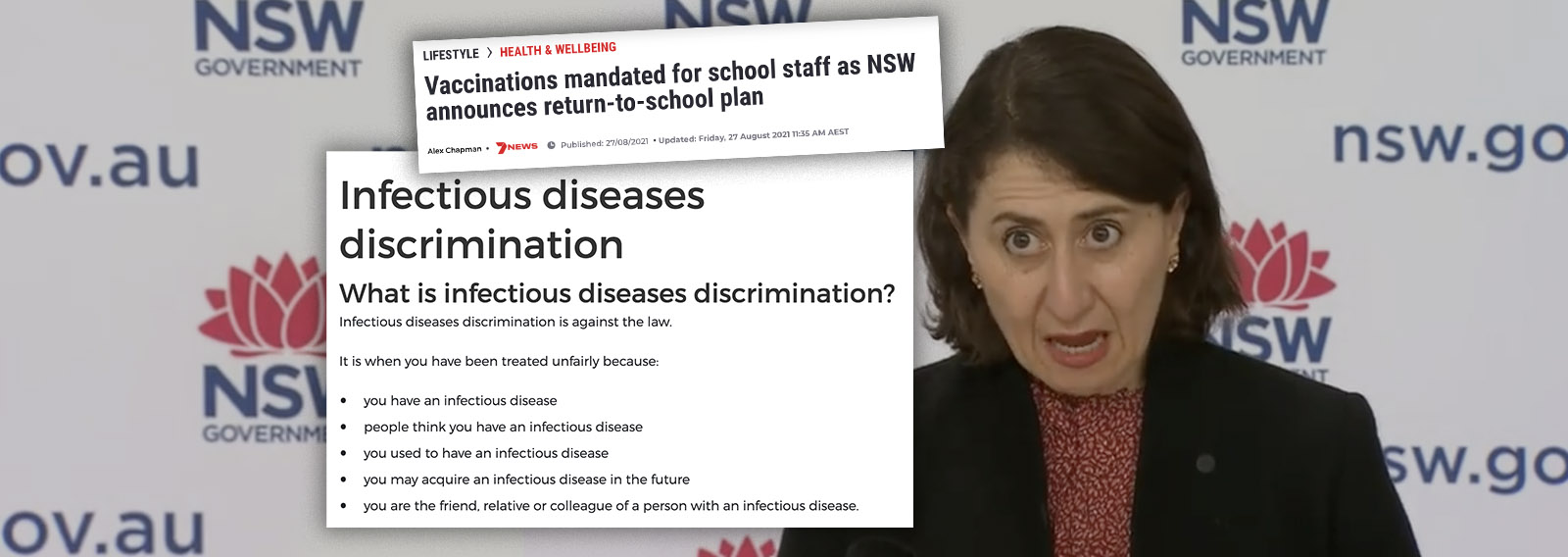Infectious diseases discrimination is against the law, according to Anti-Discrimination NSW, a state government body that administers the Anti-Discrimination Act 1977 (the Act).
The body’s website defines infectious diseases discrimination as, being “treated unfairly” because (1) you have an infectious disease; (2) people think you have an infectious disease; (3) you used to have an infectious disease; (4) you may acquire an infectious disease in the future; or (5) you are the friend, relative or colleague of a person with an infectious disease.
This also includes indirect discrimination, which is when there is a rule or requirement “that is the same for everyone but unfairly affects people with infectious diseases and is not reasonable in the circumstances.”
Places in which infectious diseases discrimination is against the law includes: (1) workplaces, such as when you apply for a job or while you are at work; (2) employment agencies, such as when you use recruitment companies; (3) when you access goods and services, such as when you go shopping, do your banking or access medical services; (4) state education, such as when you apply for study and during your studies; (5) accommodation, such as when you rent accommodation; (6) industrial organisations, such as membership of a union; (7) qualifying bodies, such as an institute that issues qualifications; (8) at registered clubs (clubs that sell alcohol or have gambling machines), such as when you try to enter or join a club.
The website states that there are rare instances when an employer or service provider may be required to comply with a law that involves discriminating against certain individuals. Examples of this include, (1) “Public health or occupational health or food-handling responsibilities to individuals in the acute stage of certain infectious diseases, such as hepatitis A and hepatitis C”; and (2) “If there is an outbreak of an infectious disease (such as whooping cough or measles) in a day care centre, preschool or primary school, the organisation’s director or principal can be instructed by the Public Health unit to exclude a child who is not immunised until the outbreak is over.”
That said, “there are only rare occasions when health and safety obligations mean that someone can discriminate against you because you have an infectious disease,” the body claims.
According to the body: “This means that it is generally against the law to: (1) refuse to hire you or provide you with a service, accommodation or education; (2) make you have a blood test; (3) segregate you from other staff or clients; (4) dismiss you from your job; (5) breach your confidentiality or privacy on the grounds that others have the right to know about your disease; (6) treat you unfairly because they think you are gay or use drugs, and therefore assume that you have an infectious disease.”
The question is, if infectious diseases discrimination includes unfair treatment on the assumption that someone has or may acquire an infectious disease, are the NSW Government’s policies against the law?
NSW Premier Gladys Berejiklian announced this week that fully vaccinated citizens will be granted freedoms denied to the rest of the population on the notion that those who are not double jabbed are more likely to acquire and spread an infectious disease.
The state government has also mandated vaccinations for all school staff, aged care workers, and health care workers. This means, not only are employees required to disclose their private medical status, but they will also lose their employment on the assumption that “people think you have an infectious disease” or that “you may acquire an infectious disease in the future.”
Is this not the very thing Anti-Discrimination NSW defines as “infectious disease discrimination”?
Furthermore, Prime Minister Scott Morrison, this week confirmed that businesses can discriminate against unvaccinated people by denying them services on the assumption that they pose a “greater health risk” to the community.
His comments come despite Anti-Discrimination NSW stating that unfair treatment in accessing goods and services on the belief that you are, or may acquire an infectious disease, is against the law.
Speaking in Parliament on Wednesday, Morrison said banning unvaccinated people from entry is a “legitimate thing” for businesses to do to “protect” employees and clients.
“The simple fact is, if you’re not vaccinated you present a greater health risk to yourself, to your family, to your community, and others about you,” Morrison said.
Isn’t denying freedoms and employment to healthy citizens on the assumption that they either have, used to have, or may acquire an infectious disease Anti-Discrimination NSW’s definition of infectious diseases discrimination?
Isn’t refusing goods and services to healthy citizens on the assumption that they either have, used to have, or may acquire an infectious disease Anti-Discrimination NSW’s definition of infectious diseases discrimination?
There will always be people who are more likely to acquire infectious diseases, either through biology or lifestyle choices. In fact, this is the reason why such anti-discrimination laws exist.
So, what is the legal basis for dismissing school teachers and health care workers, or denying goods and services to individuals based purely on the belief that they could, maybe, might, possibly acquire an infectious disease due to their medical choices?
Is this not infectious diseases discrimination? And if so, is it not against the law?




















